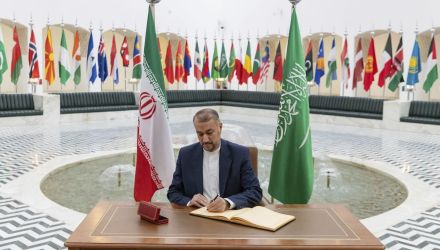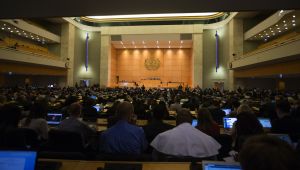As the United States begins its campaign to destroy the Islamic State, many voices can be counted on to call for cooperation with Iran. Among those has been none other than Secretary of State John Kerry, who insisted that Iran’s exclusion from the Paris Conference “doesn’t mean that we are opposed to the idea of communicating to find out if they will come on board, or under what circumstances, or whether there is the possibility of a change.” On the surface, this may seem sensible, as both Washington and Tehran have an interest in defanging a militant Sunni group. But we would be wise to bear in mind two points: first, Kerry’s proviso on the possibility of change, and second, that the essential axiom of Middle East politics is that the enemy of my enemy is sometimes still my enemy. The ebbs and flows of the war on terrorism should not be allowed to conceal the fact that the theocratic Iranian regime and its attempt to upend the regional order remains the United States’ most consequential long-term challenge in the Middle East.
The Islamic republic is not a normal nation-state seeking to realize its legitimate interests but an ideological entity mired in manufactured conspiracies. A persistent theme of Supreme Leader Ayatollah Ali Khamenei’s speeches is that the United States is a declining power whose domestic sources of strength are fast eroding. In today’s disorderly region, Iran sees a unique opportunity to project its influence and undermine the United States and its system of alliances.
In Afghanistan, in the aftermath of the 9/11 attacks, the misapprehension was born that the United States needed Iran’s assistance to rehabilitate its war-torn charge, and this misbegotten notion has since migrated from crisis to crisis. The tactical assistance that Iran offered in Afghanistan in 2001 was largely motivated by its fear of being the next target of U.S. retribution. Once it was disabused of that notion, Iran proceeded to lacerate U.S. forces in both Iraq and Afghanistan by providing munitions and sanctuary to various militias. In the meantime, Tehran sought steadily to subvert America’s allies in the Persian Gulf and to undermine the security of Israel.
Today, in the two central battlefronts of the Middle East — Syria and Iraq — Iran’s interests are inimical to those of the United States. Iran’s stake in Syria has been made clear by its provision of money, oil, arms, advisers and, most important, Hezbollah shock troops to prop up the regime of Bashar al-Assad. The United States’ interests, meanwhile, strongly argue against working with Iran against the Islamic State in Syria lest we lose the very Sunni support that will be necessary to eradicate the group. By taking a firm stand in Syria against both Assad and the Islamic State, we can send a strong signal to Iran’s leaders that the price for its troublemaking is going to rise.
Similarly in Iraq, any putative alliance with Iran would undo much of what the United States has attempted to accomplish there — the creation of a pluralistic, unitary state that does not represent a threat to itself or its neighbors and which is not a base for terrorism. The only way thatPresident Obama’s objective of not only “degrading” but also “destroying” the Islamic State can be achieved is by taking back, over time, much of the territory seized by its fighters in Nineveh and Anbar provinces. This will require not only airstrikes in support of the Kurdish pesh merga troops and Iraqi security forces but also significant buy-in from the Sunni tribes who formed the backbone of the uprising against al-Qaeda during the surge. In addition, the sine qua non of the administration’s policy is an inclusive government in Iraq that can draw support from neighboring Sunni states such as Saudi Arabia and the United Arab Emirates. Both of these will be unattainable if there is a perception that the United States is seeking a de facto alliance with Iran.
During the past decade, and over two administrations, the United States has been effective in estranging Iran from its European and even Asian customers. But Washington has not affected Iran’s position in the Middle East to the same degree. Beyond arms sales to Arab states and attempts to assuage Israeli concerns, the United States has not undertaken a systematic effort to isolate Iran in its immediate neighborhood. Instead of pursuing the chimera of cooperation with the likes of Khamenei, Washington should contest all of Iran’s regional assets. From the Shiite slums of Baghdad to the battlefields of Syria, Iran should be confronted with a new, inhospitable reality as it searches for partners.
The United States and Iran stand at opposite ends of the spectrum of Middle East politics. The Islamic republic’s ideological compulsions and sheer opportunism make it an unlikely ally for the West. The coincidence of mutual opposition to a radical Sunni terrorist group should not blind us to the enduring threat that the mullahs represent.
Ross, Dennis. “Iran remains America’s biggest challenge.” The Washington Post, September 19, 2014




